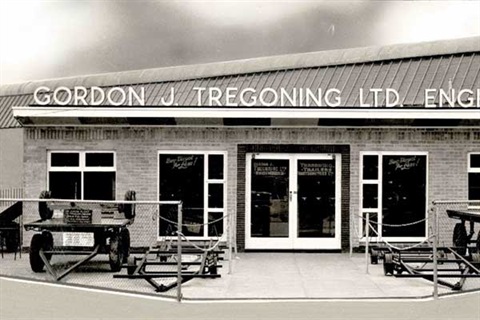TREG

Gordon Joseph Tregoning was born in Broken Hill on 19 February 1918, the youngest and only son of Joseph Edward Tregoning, ironmonger and furnisher, and his wife Bertha née Fuss.
After serving in the Navy during the Second World War, Gordon started an engineering business at his uncle’s property in Underdale. In 1948 he bought a 0.2 acre allotment at 59 Hardys Road Underdale for £375 and transferred his business there.
As the business expanded Tregoning periodically bought more land around his original site.
By 1983 he had accumulated almost four acres, costing a total of around $146,000, extending along a portion of Hardys Road and about sixty metres west down Ashley Street and Wilford Avenue.
Although dabbling at first in manufacturing and selling brick making machines – there was a huge post war need for bricks for housing construction – Tregoning soon found that the trailers he manufactured attracted the most demand.
Over the years Tregoning manufactured a wide variety of trailers of different sizes and purposes.
Among them were standard haulage trailers, tandem trailers, four-wheeled trailers, horse floats and trailers for boats, caravan chassis’ and storage tanks. Tregoning also made a range of towbars.
Tregonings manufactured a variety of items which included bus shelters, display and signage work, park benches, playground equipment, pizza ovens, rainwater tanks and wine presses. Tregoning was involved in the construction of metal artworks for local artists. Nonetheless manufacture of trailers remained the core component of his business.
Gordon insisted at all times upon quality workmanship for his products, occasionally causing them to cost slightly more than those of competitors. He especially relished the challenge of having his business repair faulty items made by other manufacturers. He would on occasion have his employees work all night so a customer could have their job ready as soon as possible.
Conventional steel-on-steel trailer couplings rattled and made grinding noises. From the late 1950s the Furness Rubber Block Hitch, a rubber-backed coupling device that virtually silenced noises, began to replace the traditional ball on a towbar.
Although using the same mechanical principles, Tregoning’s TREG Poly Block Coupling improved on the design by working like a universal joint with 70% oscillation.
The Treg Poly Block Coupling was also much safer than traditional couplings. The Tregoning design was registered and is still sold. Other manufacturers have attempted to produce a like product, even appropriating the TREG name, but none have the same design and quality.
In the 1990s and 2000s the Australian economy changed irrevocably. Manufacturing had declined, particularly in South Australia, cheap imports had proliferated and keeping afloat a niche manufacturing business like Treg Trailers became more challenging. The business was also to some extent a victim of its insistence upon product quality and longevity.
Consumers, a part of an increasingly throwaway society, were drawn to cheaper alternatives even knowing that Tregoning’s products would last decades longer.
After the retirements of several long term employees, and with the company workforce then down to around a dozen, directors Ian and Lisa Tregoning closed the business on 30 June 2022.